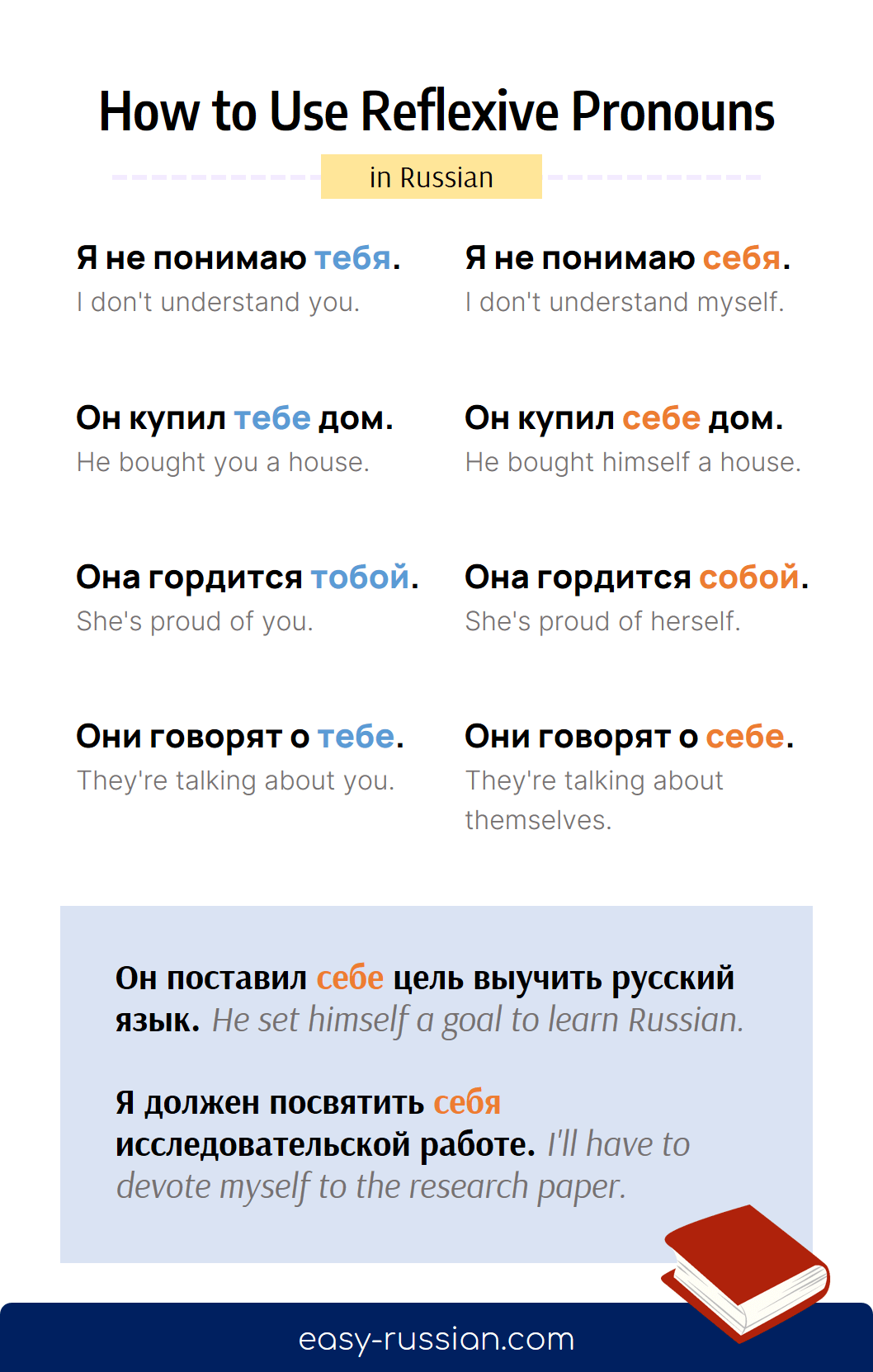What are Reflexive Pronouns in Russian
Imagine you have a special set of verbs that highlight actions when someone does something to themselves or when the action directly affects them. We call them reflexive verbs. Just like superheroes, these verbs have sidekicks called reflexive pronouns, such as myself, yourself, etc., that show who is performing the action on themselves.
Wait a minute, though… that’s the English language. We’re learning Russian here, and it’s always different. Oh no!
Well, yes, I have some bad news for you: reflexive pronouns in Russian do not form reflexive verbs. They are completely different, separate words. And you’re going to have to learn how to use them.
Reflexive Pronoun Forms
Let’s start with an example. How do you say in Russian that a person has washed himself? There are two ways:
- он помылся
- он помыл себя
The sentences mean the same thing, and we used the reflexive pronoun in the second sentence. However, when specifically considering this case, the first sentence sounds much better and is the one that most native speakers will use.
Unless there is a need to emphasize that the person washed themselves without the help of others, such as when discussing someone who is unable to move. In that case, we should say:
Он помыл себя сам. – He washed himself.
It is “сам” that we use when talking about independence.
But let’s return to the pronoun “себя“.
It is the only reflexive pronoun in the Russian language. And it’s easy to remember – it does not change depending on the gender and number of the subject.
- я помыл себя
- ты помыл себя
- он помыл себя
- она помыла себя
- они помыли себя
However, we also have cases, don’t forget that. So we will have to memorize 4 additional forms.
| Case | Pronoun |
| Nominative | |
| Genitive | себя |
| Dative | себе |
| Accusative | себя |
| Instrumental | собой (собою) |
| Prepositional | (o) себе |
See Also: Personal Pronouns in Russian
How to Use себя/себе in Russian
Now comes the hard part.
It is very difficult to use the reflexive pronouns in Russian, because you need to know in which cases they work and in which cases they do not.
For example, in English it is common to say “to feel”, and in Russian “чувствовать себя” (to feel oneself). That is, we, unlike English speakers, use the reflexive pronoun.
Как ты себя чувствуешь? – How are you feeling?
Я плохо себя чувствую. – I don’t feel well.
Я чувствую себя счастливым. – I feel happy.
By the way, the reflexive verb “чувствоваться” is not suitable for describing one’s state. Only “чувствовать себя”.
Another examples:
Мы можем полагаться только на себя. – We can only rely on ourselves.
Она любит книги и считает себя интеллигентной дамой. – She loves books and considers herself an intelligent lady.
Уважай себя и свои границы. – Respect yourself and your boundaries.
Принимай себя таким, какой ты есть. – Accept yourself as you are.
Они делают всё возможное, чтобы защитить себя и своих близких. – They do everything possible to protect themselves and their loved ones.
Посмотри на себя в зеркало. – Take a look at yourself in the mirror.
“Себя” is used with the genitive and accusative case. “Себе” – with the dative and prepositional. “Собой” – with the instrumental.
If you are familiar with the use of cases and pronouns, using the case forms of the pronoun “себя” will not be difficult.
Compare:
| Я люблю тебя. (I love you.) | Я люблю себя. (I love myself.) |
| Я делаю это для тебя. (I am doing this for you.) | Я делаю это для себя. (I am doing this for myself.) |
| Я приготовил тебе чашку кофе. (I made you a cup of coffee.) | Я приготовил себе чашку кофе. (I made myself a cup of coffee.) |
| Он гордится тобой. (He is proud of you.) | Он гордится собой. (He is proud of himself.) |
| Она верит в тебя. (She believes in you.) | Она верит в себя. (She believes in herself.) |
The pronoun “себе” is used to indicate actions directed towards oneself or the indirect object of an action.
Я позволил себе немного отдохнуть. – I allowed myself to relax a little.
Он поставил себе цель выучить русский язык. – He set himself a goal to learn Russian.
Мы всегда стараемся уделить время себе. – We always try to dedicate time to ourselves.
Мы часто говорим себе, что всё будет хорошо. – We often tell ourselves that everything will be fine.
Most of the time we use “себе” instead of “для себя”.
Она испекла себе торт на день рождения. – She baked herself a cake for her birthday. (= Она испекла для себя торт на день рождения.)
Я купил себе новую книгу. – I bought a new book for myself. (= Я купил новую книгу для себя.)
Она выбрала себе платье. – She chose a dress for herself. (= Она выбрала платье для себя.)
Ты можешь оставить себе одну книгу. – You can keep one book for yourself.
Here, “себе” is used when the action of giving or doing something is directed towards oneself or as the indirect object of the action.
Some other examples with “собой” and “(о) себе“:
Вы, кажется, довольны собой. – You seem pleased with yourself.
Он говорит о себе. – He talks about himself.
Я думаю о себе и своих нуждах. – I think about myself and my needs.
Причины своих поражений нужно искать в себе. – The causes of defeat should always be sought in yourself.

Reflexive pronouns are also used in idioms:
- выйти из себя – to lose control of one’s emotions
- взять себя в руки – to pull oneself together
- быть вне себя от злости – to be furious
By using reflexive pronouns, you can clearly convey self-directed actions or reciprocal actions in Russian sentences.
See Also: Relative Pronouns in Russian
Свой (своя, своё, свои)
I know I said that there is only one possessive pronoun in Russian, but there is actually another one that is a reflexive possessive pronoun.
Свой means “one’s own”.
Examples:
Он любит меня как свою дочь. – He loved me as his own daughter.
Одно из самых важных событий в жизни человека – обретение своего дома. – One of the most important achievements in life is having your own home.
By the way, that’s not all. Often, “свой” is used as a possessive pronoun, and this is when things get really tough.
You can read more about it in the article about possessive pronouns in Russian.
Well, that’s it for now. We’ve explored the intriguing world of reflexive pronouns in Russian. As we discovered, understanding and using these pronouns correctly can be quite challenging. The various forms and nuances might seem overwhelming at first, but fear not! With time, patience, and lots of practice, anyone can master these linguistic gems.
So, don’t be discouraged if you find this topic daunting. Keep practicing, reading, and engaging with the language. Soon enough, possessive pronouns will become second nature, enhancing your ability to communicate and express yourself fluently in Russian.
Happy learning and mastering the language!
